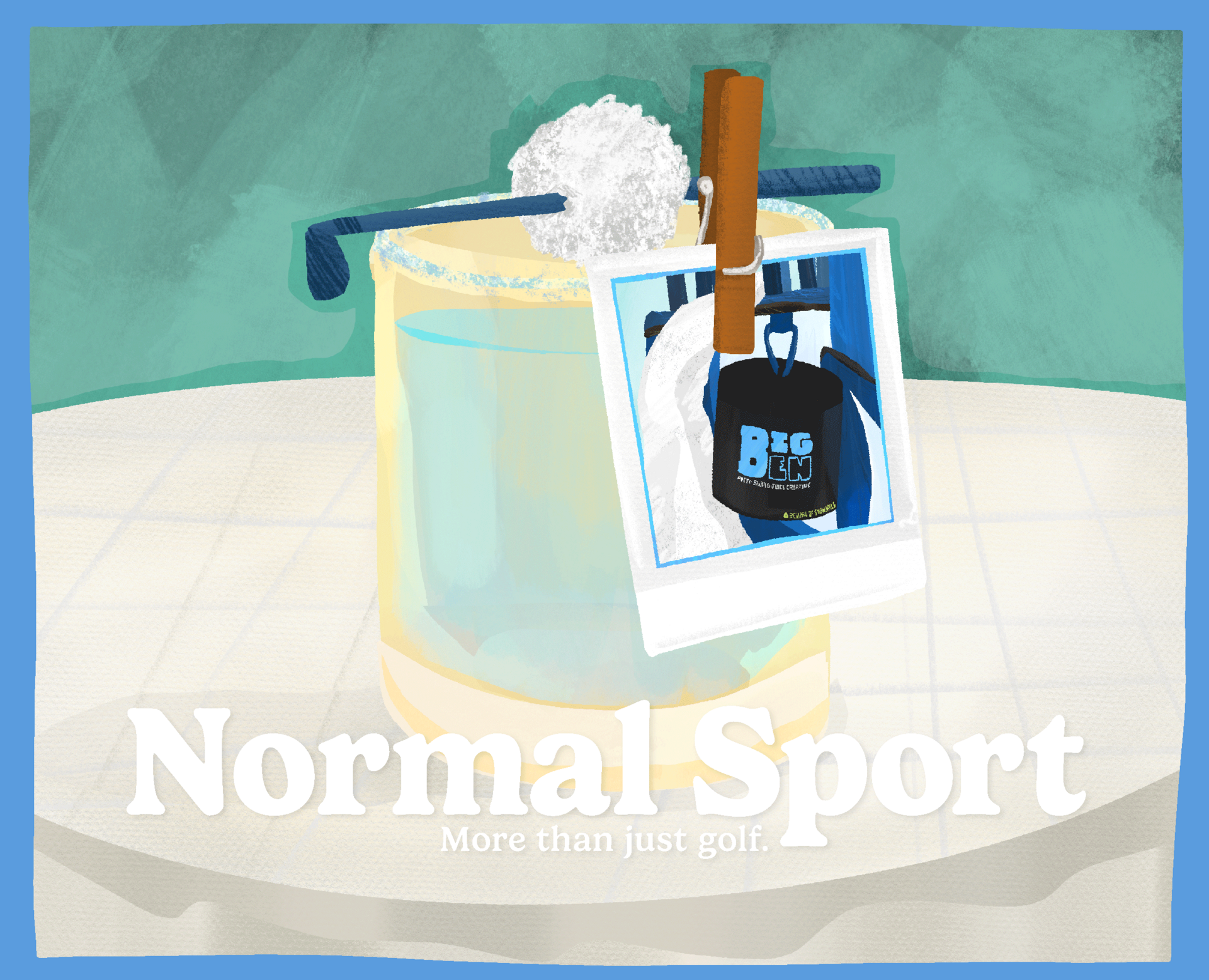
Greetings!
I am so fired up for the new year to start. Last year was difficult and bizarre at times and one I will remember fondly for some reasons — first year running this business full time! — and not so fondly for others.
This will surprise nobody who has been reading this newsletter closely, but I love the reset a new year offers. Love the opportunity to clear out old goals and make some new ones.
If I’m being honest, I’m more anxious and nervous about Year 2 of Normal Sport than I was entering Year 1. The first year of a thing always offers a type of novelty that wears off by the second time around. At that point, your stuff has to be good. Has to be great. Your vision has to be clear. Your value has to be high.
These are all challenges I enjoy taking on and envision fulfilling in Year 2 of Normal Sport, but I do feel like I’m entering “Rory just birdied 10, hope it works out!” territory compared to last year’s version, which was way more, “Welp, Scottie is up 17 shots with three holes to go.”
All that to say, stick with us this year. We’re going to be trying some new things out. We’re getting in the lab. Working on some experiments. Testing, re-testing. Seeing what works and what’s sustainable for the long term.
The newsletter will stay the same for the most part, albeit probably be published more infrequently than it was a year ago. My Twitter presence will stay the same. Audio and video — YT, Instagram, podcast — are the parts we’re still toying with, still trying to figure out and solve for as it relates to our place in the content world. Our show was fun in the fall, and I enjoyed making it. But it didn’t get the traction I had perhaps hoped.
I have some ideas on that, some formats I want to try — it’s basically all I thought about over Christmas — and this pod was so instructive. One question I have for you regarding podcasting, and I would love any thoughts you have (if you vote below, you can also leave a comment).
If you don’t know Acquired, they do 3-hour dives on amazing companies and businesses (that are great). You can see some of their episodes here. Very cool pod.
Regardless of where we land or how it goes, our mission remains the same: Use humor and heart to make the daily fan’s personal experience of golf feel more meaningful.
We hope you’ll join us for the 2026 ride.
Name drops today: Scottie Scheffler, Rico Hoey, Brian Rolapp, Joker, Brad Dalke, Akshay Bhatia and Grant Horvat.
Today’s newsletter is sponsored by the Normal Club.
As I sat down to write down goals for Normal Sport in 2026, building out our membership, the Normal Club was at the top of the list. Giving those of you who have joined more ways to interact with each other and providing value well beyond the $82 it costs to join.
If you like our stuff, this is the best way to support Normal Sport, the best way to be part of what we’re doing. We ran a holiday special that got a bit lost — as things do in the black hole from Thanksgiving to New Year’s.
But we’ll extend it a bit into this year. If you use the code NY2026 at checkout here, your membership will only be $50 for 2026.
You’ll get our daily updates from majors, get to play in our major fantasy contests where we gave away $10K+ last year, have a way to interact with other Normal Club members, get a discount to the pro shop and much more.
OK, now onto the news predictions.
We had to break this into two parts. Part one today. Part two coming on Friday!
Nothing makes me feel more vulnerable than trying to predict what’s going to happen throughout a year in golf. Oh sure, yes I will put myself and my reputation out there with some absolute #takes. Most of which will be not even close to correct. ⤵️

I can’t even tell you who’s going to win a major when there are like three holes left, and here we are prognosticating about an entire year.
Nevertheless, I find myself in the same spot every January, and I know how much I enjoy reading predictions from other people so I figured I should make some of my own for you to enjoy and mock as the months go on.
Here we go.
1. Scottie Scheffler’s streak … continues? Of all the wild Scottie stats that are out there, I think I found that most absurd one (at least to me).
My favorite Scottie stat is not that he’s made 69 consecutive cuts, has won 18 times in the last three years or that he had as many major wins in 2025 (2) as he did finishes outside the top 11 (also 2). No, it has to do with the quote he gave at The Open last year.
What works best for me is just to stay present, continue to put in the work, which I would argue that's the most fun part for me. I love being able to practice, and that's what I enjoy doing, and just try to get the most out of myself each day.
Scottie Scheffler
The numbers disclose that this is true.
Consider the following statistic: Of all the golfers in the world who were positive strokes gained in 2020, only one of them has improved his SG number year over year every year since then. You would suspect it would be somebody like Wyndham Clark, who was 0.22 SG in 2020 and could have achieved this feat by improving marginally every year since then until now when he was at 1.2 or something reasonable.
Nope, it’s Scheffler, who had the 12th best SG number in the world in 2020 at 1.61. Somehow, this is the same person who has topped that every single calendar year since then.
2020: 1.61 SG (12th)
2021: 1.63 SG (13th)
2022: 2.32 SG (2nd)
2023: 2.83 SG (1st)
2024: 3.22 SG (1st)
2025: 3.29 SG (1st)
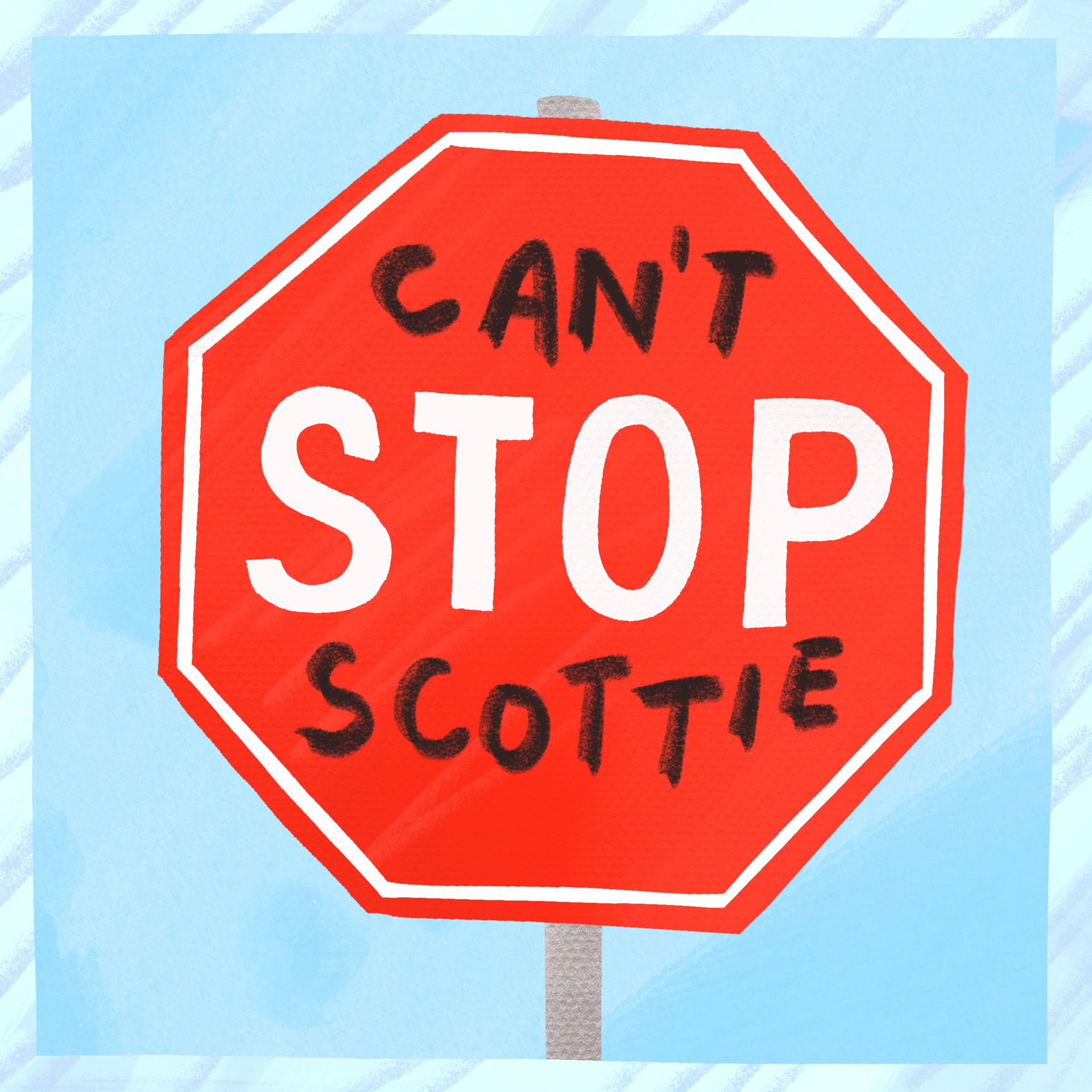
This is … impossible. Just doesn’t happen that a top 15 golfer gets better every year for five consecutive years. And yet, I think it’s the thing I love most about Scottie. That his disposition is such that the main competition he cares about is with himself.
I don’t know how much longer he can keep this up, but I do believe he will (somehow) do it for one more year in 2026 (oh, and nobody other than Tiger has touched 3.3 SG in a season in the last 40+ years). Tiger did it … many times.

Although Scottie’s age 28 and age 29 years were better. And his age 27 was pretty dang close.

Amazing, extraordinary stuff we’re seeing in real time. A joy to cover as always.
2. Brian Rolapp wants it all … and gets it: There are two sentences that I keep going back to as it relates to the PGA Tour’s future. Both deal with whether the Tour is going to implement its forthcoming changes slowly over time or fully burn it down in 2027 and implement everything all at once.
The first is from Rolapp at the Tour Championship last year.
The goal is not incremental change. The goal is significant change.
Brian Rolapp | August 2025
The second is from Tiger a month ago.
Q. Could you see a phased rollout where some stuff changes in '27 or do you want one fell swoop?
TIGER WOODS: That is again one of the different concepts we're looking at as well, rip the Band-Aid off, create a whole new product, [or] do it staged.
Tiger Woods | 2025 Hero World Challenge
My guess is that both Rolapp and Tiger want the latter but are receiving (or will receive) pushback from the mules, who have started stamping their feet.
The PGA Tour policy board — the decision-making apparatus for the biggest golf league in the world — is still half players, which makes going for it all that much more difficult.
However, players will do anything Tiger says (and he seems fully engaged here), and also the other players currently involved (outside of Tiger) — Cantlay, Adam Scott, Mav McNealy, Camilo Villegas and Keith Mitchell — are smart and are mostly stars or at least adjacent to it, which makes it easier to sell wholesale change.
I have said before that the Tour is like an old piece of software with innumerable forks and amendments to the amendments, and all of it needs to burn.
Rolapp’s pillar of desiring simplicity would imply that he agrees, and I hope he agrees enough to go full Joker this year as the Tour looks ahead to 2027.

3. Good college golfers will turn pro in … YouTube golf: I’ve been on this corner and will remain on it. YouTube golf is a competitor to the PGA Tour both for sponsorships as well as talent acquisition. Two recent quotes that surprised me.
The first was Bryson saying that he might leave LIV for YouTube.
[LIV is] where I want to be, but ultimately, it’s got to make sense for everybody. Because I could just do YouTube golf and be totally fine as well.
Flushing It via Golf.com
This is … a negotiation tactic? Or maybe it’s not. Bryson is crazy enough to be a YouTuber/major golfer. How insane would that be?! Also, would it be that different from what he’s doing right now?
Related: never forget this.
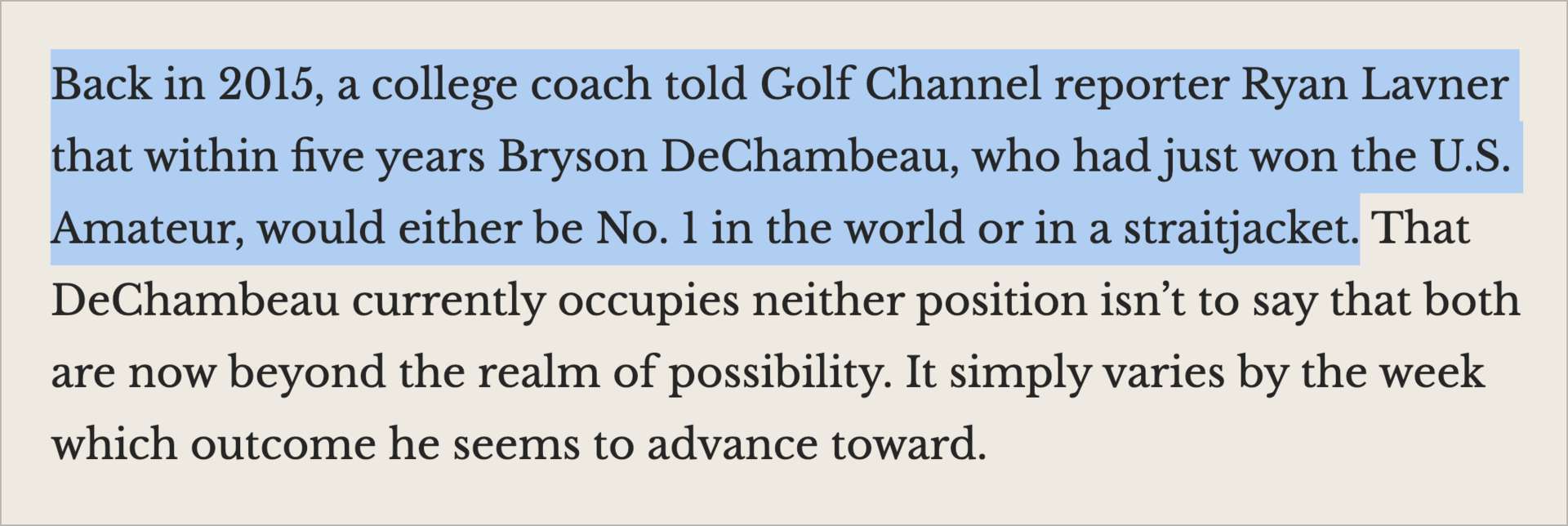
The second quote that surprised me was from the Bryan Brothers interview in TGJ.
Everything has completely shifted now: All I want to do is create content. If you were to tell me I’d win 10 more times on the PGA Tour, I still wouldn’t give up the YouTube side of things. I’m completely at peace, even if I disagree with the decision the Tour made [to suspend me].
Wesley Bryan in TGJ
The Tour is viewed as a zero-sum game. Only one golfer wins the Masters every year. Only one golfer wins The Open. Only one golfer wins the Players. That’s part of why all of it is popular.
YouTube golf is not a zero-sum game (and is honestly probably more fun, too). You can absolutely make a living doing it no matter whether other people are also making a living also.
YT golf can be your job in a way that seems more accessible and controllable than grinding your way up to No. 118 in the OWGR (where do you think Grant Horvat would have finished on the PGA Tour money list last year?). I’m not saying what Horvat does is easy. I am saying it probably seems more attainable to college golfers than beating Rory and Scottie every week.
Brad Dalke is a good example of this. Nearly won the U.S. Amateur, played in the Masters and now plays on YouTube. Does that happen 40 years ago, or is he over in Europe grinding it out to get into the Spanish Open? I honestly don’t know, but the fact that it’s a question means more Brad Dalkes are going to take this path.

[Jason’s prediction] I’d go one step further with YouTube golf predictions. I think Bryson, in LIV-PGA limbo, will kick off a new competitive Youtube league that could foreshadow future online alternative formats for the PGA Tour. Something along the lines of Chess dot com’s Titled Tuesday that you might have heard me rave about on a recent podcast. James Colgan recently wrote a great article about how lucrative Bryson’s channel can become.
4. Jon Rahm has a monster year: Both of these lines are SG average for former Arizona State Sun Devils superstars. One is Rahm, the other is Phil.
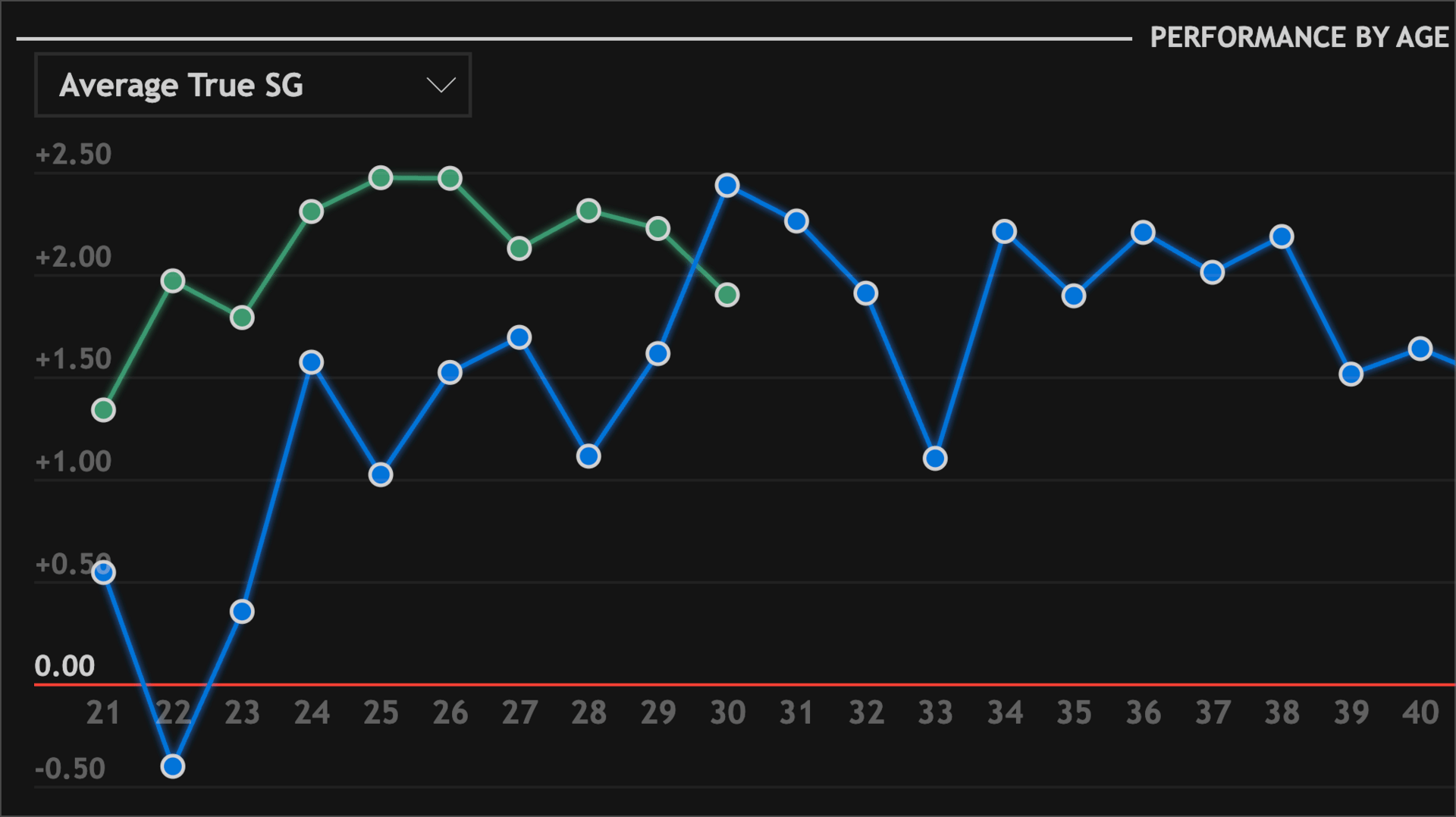
Did Rahm see a downturn in his overall SG performance in 2025? Absolutely. Did he fail to win any event worldwide for the first time since 2012? Yes. Did he also somehow win the 2025 LIV individual champion award despite this? Amusingly … yes!
I think an important point with Rahm is this … here are the number of golfers who outperformed him from tee to green over the last 12 months, according to Data Golf: 1.
And it’s the guy who bodied Rahm at the Whistling Straits Ryder Cup in 2021 back before that same guy went on a four-majors-in-four-years tear.
By the way, Rahm is in green above. Phil is in blue.

Outside of LIV eroding his competitive edge a bit, I’m mostly unconcerned about Rahm. He is generationally good and has been for almost a decade. Do guys like that fall off after 10 years? I guess. But we’re talking about a player at a level where it’s rare that it happens.
There are always ups and downs across years. Wins come and go. Greatness remains. Rahm is great, and I think he will continue to be for a long, long time.
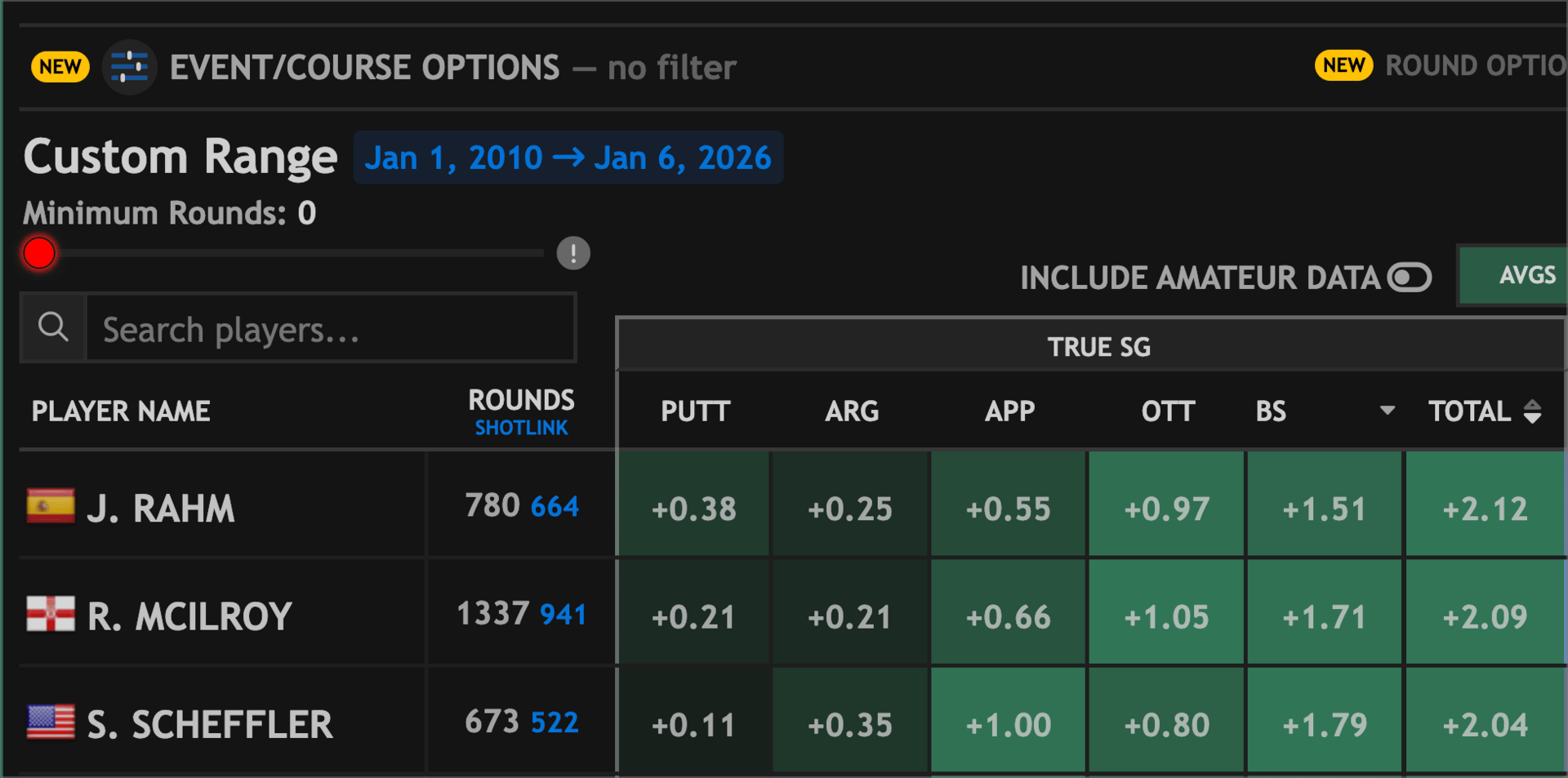
5. Akshay makes the leap: Akshay Bhatia …
Is two years younger than Ludvig
Is four years younger than Hovland
Has improved his ball-striking every year for the past four years
Is tracking almost exactly with Justin Thomas’ trajectory.
Here’s a look.
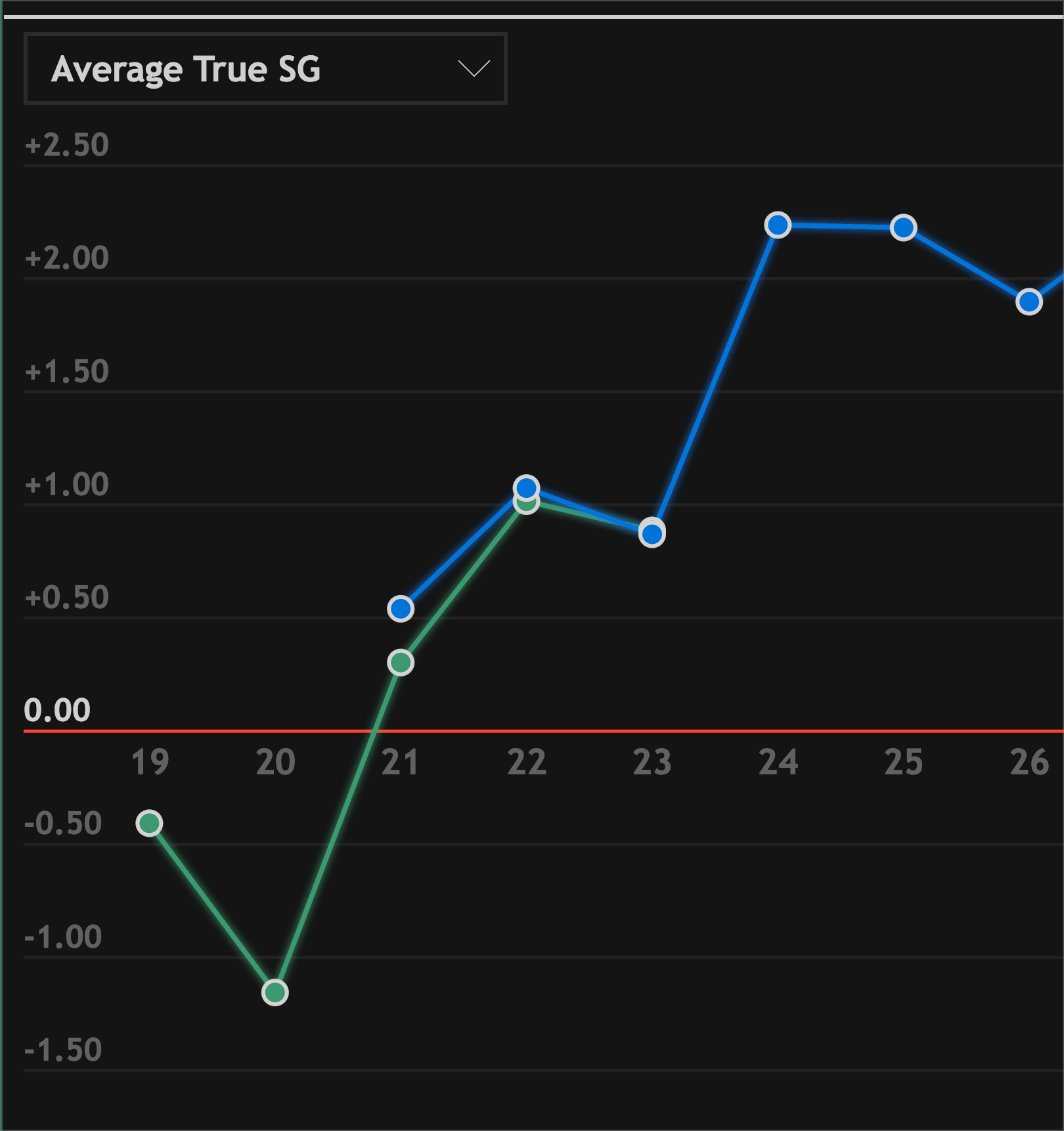
Akshay is green, JT is blue
I probably want this to be true more than I actually believe it to be true. But Akshay is (by far) the youngest great iron player in the world (he’s six years younger than Rico Hoey, who everyone is drooling over going into 2026).
There are certainly concerns, but he enters his age 24 season with some great experience as a two-time PGA Tour winner with a ceiling that I still believe is quite a bit higher than he’s shown thus far.
That’s a wrap for today’s predictions. Five more coming on Friday afternoon!
Don’t forget about the NY2026 deal for membership into the Normal Club.
As always, this newsletter is handcrafted and exists outside the algorithms that ridiculously govern all of our lives. It takes a lot of time to make it, which is entirely the point. We want the friction because friction implies care, and we care a lot about producing something that brings about joy in your golf life.













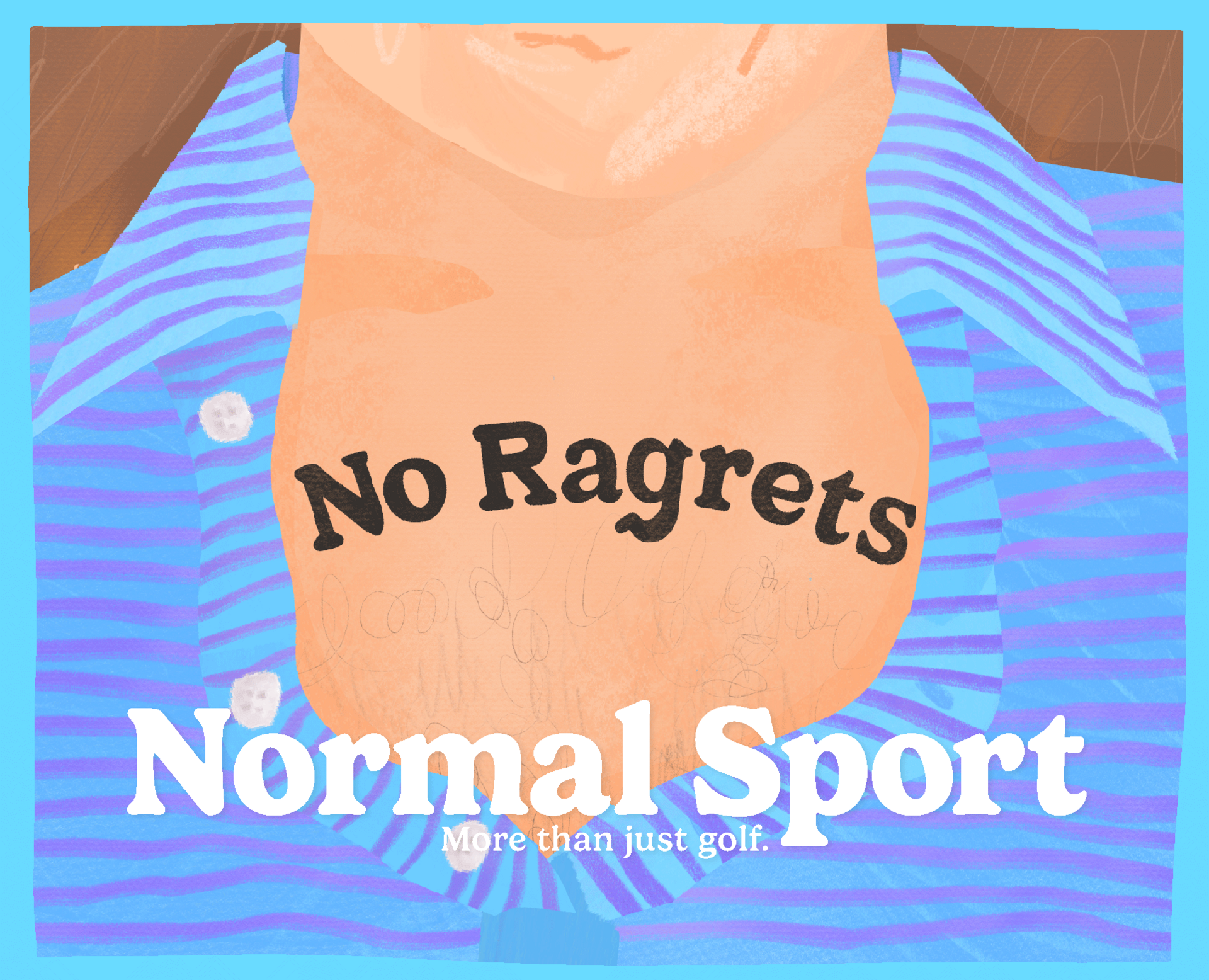

I’ve always enjoyed your love for golf. So often I see favoritism showed to golfers in the social media world, but I enjoy reading you telling a situation how it is regardless of the person.

Normal Sport is exploratory, sometimes emotional, always entertaining. It also has one of my favorite writers in the biz at its foundation.

Kyle is the best columnist in sports. That he has channeled those talents through strokes gained and Spieth memes is a blessing to golf.

Kyle approaches coverage of the game with both conviction and curiosity

Kyle sees golf in a way that no one else does—and we're all fortunate to get to share in that view through Normal Sport!

Kyle is a perfect curator of the necessary moments of levity that accent a sport that will drive most of us insane.

Few make the sport feel as fun and as thought provoking.

The way Kyle has been able to mold a silly Twitter joke (normal sport) into a must-read newsletter on the weekly happenings in our silly game gives a great look into why he's one of the smartest people in golf.

Kyle's content is a product of a sick sense of humour, a clear passion for golf and unquestionable dedication to hard work. That's not normal!

It's a treasure trove of the important, the seemingly important, and — importantly! — the unimportant stuff. It's an asset in my inbox.

Kyle is one of the best in the golf world at finding and synthesizing the absurd, the thoughtful and the fun things that make being a golf fan worthwhile.

There’s been no one else in golf that has tickled my funny bone as often as Kyle Porter does. He’s been instrumental in ushering in a new era of golf coverage and it’s been a pleasure to be along for the ride in that.











.svg)
